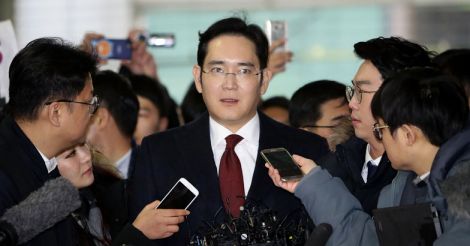Seoul: Samsung Group leader Jay Y. Lee left the South Korean special prosecutor's office early on Friday, more than 22 hours after arriving for questioning on bribery suspicions in an influence-peddling scandal that could topple president Park Geun-hye.
Lee left the special prosecution office without answering reporters' questions and headed to a waiting car.
Prosecutors have been investigating whether Samsung provided 30 billion won to a business and foundations backed by Park's friend, Choi Soon-sil, in exchange for the national pension fund's support for a 2015 merger of two Samsung affiliates.
A spokesman said the special prosecutor's office would decide "soon" whether to seek a warrant to arrest the 48-year-old Lee, the third-generation leader of South Korea's largest conglomerate, or chaebol. There were no plans to bring him in for further questioning.
Lee denied some of the suspicions against him but had admitted to others, said Lee Kyu-chul, a spokesman for the special prosecutors' office who declined to elaborate.
A Samsung spokeswoman declined to comment.
The corruption scandal has engulfed the highest reaches of South Korea's elite, with Park impeached by parliament in December, a decision that must be upheld or overturned by the Constitutional Court. Park, who has been stripped of her powers in the meantime, has denied wrongdoing.
Jay Y. Lee was named as a suspect on Wednesday and summoned on Thursday morning for questioning.
Prosecutors were looking into whether he gave false testimony during a parliamentary hearing in early December, where the heads of nine of South Korea's biggest chaebol were subjected to an unprecedented 13-hour televised grilling by a panel investigating the presidential scandal.
Jay Y. Lee denied bribery accusations during that hearing, rejecting assertions from lawmakers that Samsung lobbied to get the fund to back the merger.
Shares in group flagship Samsung Electronics, the world's largest smartphone maker, were down about 2.5 percent on Friday.
Equestrian connection
The special prosecution also questioned Park Sang-jin, a president at Samsung Electronics, for about 13 hours until early on Friday.
Park Sang-jin had signed a contract for Samsung Electronics in 2015 to sponsor an equestrian team, the main beneficiary of which was the daughter of president Park's friend Choi, a key figure in the scandal who is in detention and undergoing a criminal trial. Choi has denied wrongdoing.
Her daughter, 20-year-old Chung Yoo-ra, was arrested by Danish police early this month after she was sought by South Korean authorities. Chung, who won a gold medal in group dressage at the 2014 Asian Games, has denied wrongdoing.
Park Sang-jin, who had refused to appear at parliamentary hearings on the matter citing health issues, did not comment to reporters as he left the prosecutors' office at about 3 am wearing a white face mask.
Two other Samsung Group executives were questioned by special prosecutors on Monday and released.
Samsung has acknowledged making payments to two foundations at the center of the scandal, as well as to a consulting firm controlled by Choi, but has repeatedly denied accusations of lobbying to push through the controversial 2015 merger of affiliates Samsung C&T Corp and Cheil Industries Inc.
Dozens of South Korean corporate groups made contributions totaling 77.4 billion won to two foundations that were set up to back President Park's initiatives, but Samsung's donations were the largest.
Late last month, the head of South Korea's National Pension Service, the world's third-largest pension fund, was arrested after he acknowledged that he had pressured the fund to approve the $8 billion merger between the two Samsung Group affiliates while he was head of the health ministry, reversing an earlier public denial.
(Reuters)
























 Lee Jae-Yong, vice chairman of Samsung arrives at the office of the independent counsel .
Lee Jae-Yong, vice chairman of Samsung arrives at the office of the independent counsel .